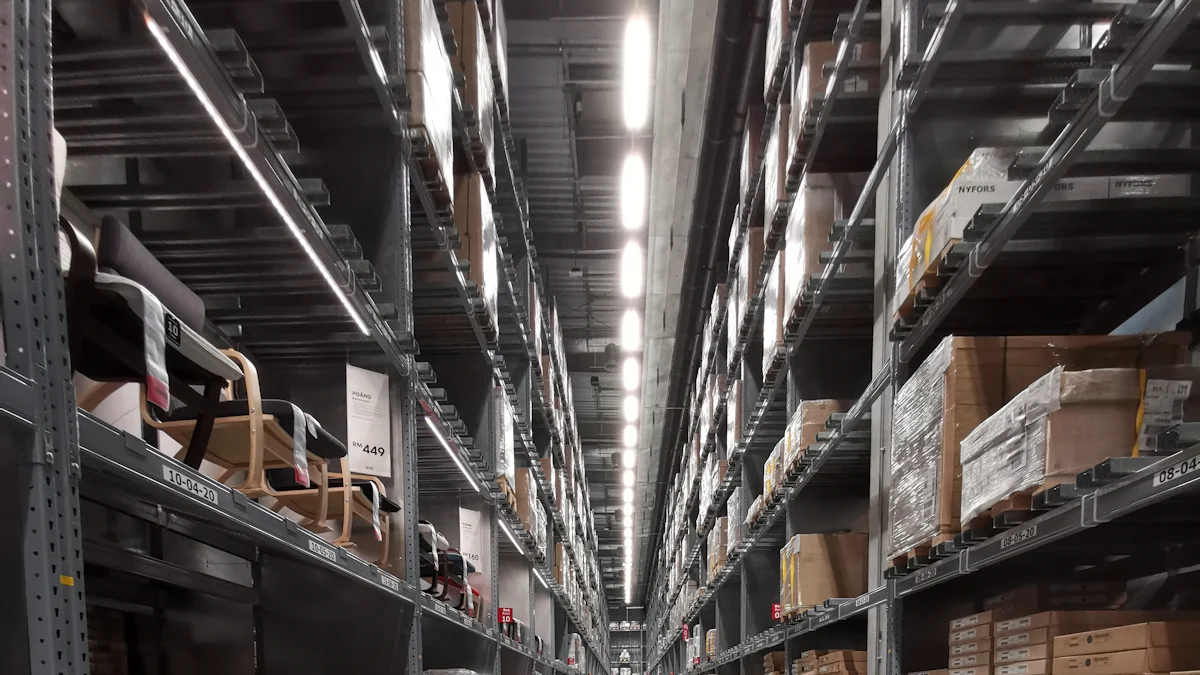Top 5 Inventory Management Software Compared

Effective inventory management plays a crucial role in business operations. Proper inventory tracking systems help businesses maintain optimal inventory levels, reducing costs and preventing stock shrinkage. This comparison will focus on five leading software solutions: Salesforce Commerce Cloud, NetSuite, Fishbowl, Cin7 Omni, and Zoho Inventory. The goal is to provide valuable insights to help businesses choose the best inventory management software for their needs.
Inventory Tracking Systems: Salesforce Commerce Cloud

Overview
Salesforce Commerce Cloud stands out as a robust cloud-based commerce platform. It offers a variety of out-of-the-box features and tools designed to enhance online business operations. The platform enables businesses to streamline purchasing processes, personalize buying experiences, and create mobile-friendly shopping environments. Salesforce Commerce Cloud forms part of the integrated Salesforce Digital 360 platform, allowing businesses to engage with their audience across multiple digital channels.
Key Features
Embedded Einstein AI Technology: Tracks and analyzes customer behavior, providing personalized product recommendations.
Commerce + CRM Integration: Combines commerce and customer relationship management for a seamless experience.
Headless Commerce: Offers flexibility in managing front-end and back-end systems independently.
Global Scalability: Supports business expansion across geographical boundaries.
Smart Analytics: Provides data-driven insights to improve marketing performance and customer engagement.
Pros
Comprehensive Feature Set: Includes tools for both B2B and B2C solutions.
High Customizability: Advanced customization options with Page Designer and multiple add-ons.
Enhanced Customer Engagement: Boosts and automates customer interactions through various touchpoints.
Streamlined Payments: Ensures hassle-free checkout processes.
Rapid Market Launch: Speeds up time-to-market for new products and services.
Cons
Complexity: May require significant time and expertise to fully utilize all features.
Cost: Higher price point compared to some competitors, potentially limiting accessibility for smaller businesses.
Pricing
Salesforce Commerce Cloud employs a subscription-based pricing model. Costs vary depending on the specific needs and scale of the business. Detailed pricing information can be obtained directly from Salesforce representatives.
User Reviews
Users praise Salesforce Commerce Cloud for its extensive capabilities and integration with other Salesforce products. Major brands like Adidas, Puma, and Lacoste utilize the platform to enhance their eCommerce operations. Users appreciate the platform's ability to provide personalized customer experiences and its robust analytics tools. However, some users note the steep learning curve and higher costs associated with the platform.
Inventory Tracking Systems: NetSuite
Overview
NetSuite Inventory Management forms a crucial part of Oracle’s ERP business management suite. This multichannel system provides a real-time overview of inventory across multiple locations. Businesses can track and fulfill orders across retail stores, pop-up shops, 3PLs, and warehouses. The system traces activities through every part of an order, identifying inefficiencies. NetSuite Inventory Management offers insights into the bigger picture, tracking inventory based on demand planning and sales forecasts.
Key Features
Real-Time Inventory Visibility: Provides a comprehensive view of inventory levels across multiple locations.
Order Fulfillment: Manages order fulfillment efficiently across various channels.
Demand Planning: Tracks inventory based on sales forecasts and demand planning.
Multi-Location Inventory: Supports inventory tracking at multiple locations.
Integration Capabilities: Integrates seamlessly with other retail systems like Shopify and accounting programs.
Pros
Comprehensive Tracking: Offers detailed tracking of inventory and order fulfillment.
Scalability: Supports businesses of all sizes with multi-location capabilities.
Efficiency: Reduces manual processes, saving time and minimizing human error.
Integration: Enhances functionality by integrating with other retail and accounting systems.
Insightful Analytics: Provides valuable insights for demand planning and inventory management.
Cons
Complex Setup: Initial setup may require significant time and expertise.
Cost: Higher price point due to annual license fees and one-time setup charges.
Pricing
NetSuite Inventory Management employs an annual license fee model with an additional one-time setup charge. Pricing details vary based on the specific needs and scale of the business. Businesses should contact NetSuite representatives for detailed pricing information.
User Reviews
Users commend NetSuite Inventory Management for its real-time visibility and comprehensive tracking capabilities. Many businesses appreciate the efficiency gained from reduced manual processes and the integration with other retail systems. However, some users mention the complexity of the initial setup and the higher costs associated with the platform.
Inventory Tracking Systems: Fishbowl
Overview
Fishbowl Inventory serves as a comprehensive solution for small and medium-sized businesses. This software facilitates inventory management, warehousing, and manufacturing operations. Businesses can gain visibility and control on the shop floor with job control and work order management. Fishbowl Inventory supports manufacturing through the management of bills of materials and production orders. Barcode scanning capabilities ensure accuracy and efficiency.
Key Features
Detailed Inventory Tracking: Tracks inventory levels, locations, and movements in real-time.
Warehouse Management: Simplifies warehouse activities and boosts overall efficiency.
Manufacturing Support: Manages bills of materials and production orders.
Barcode Scanning: Enhances accuracy and efficiency in inventory management.
Multi-Location Tracking: Provides detailed tracking across multiple locations.
Pros
User-Friendly Interface: Easy to implement and navigate.
Versatile: Suitable for both small businesses and large enterprises.
Real-Time Insights: Offers real-time updates on inventory costs.
Comprehensive Features: Includes tools for inventory, warehousing, and manufacturing.
Positive Reputation: High user ratings and positive reviews.
Cons
Initial Setup: May require time and expertise for full implementation.
Cost: Higher price point compared to some competitors.
Pricing
Fishbowl Inventory employs a subscription-based pricing model. Costs vary based on the specific needs and scale of the business. Detailed pricing information can be obtained directly from Fishbowl representatives.
User Reviews
Users praise Fishbowl Inventory for its comprehensive features and user-friendly interface. Many businesses appreciate the detailed tracking and real-time insights provided by the software. Positive reviews highlight the software's versatility and suitability for businesses of all sizes. However, some users mention the complexity of the initial setup and the higher costs associated with the platform.
Inventory Tracking Systems: Cin7 Omni
Overview
Cin7 Omni offers a customizable inventory and order management solution designed for brands aiming to scale at an enterprise level. This advanced system supports the integration of new sales channels and expansion into new areas. Cin7 Omni provides robust visibility and collective purchasing capability for multiple business entities. The platform enables businesses to manage various brands from a single account, streamlining operations across multiple locations.
Key Features
Connected Inventory Performance (CIP): Ensures real-time visibility and automation, reducing manual processes.
Extensive Integrations: Supports over 700 integrations, including accounting, e-commerce, marketplace, 3PL warehouse, shipping, and EDI.
Customizable Workflows: Allows businesses to tailor workflows to unique needs without expensive development costs.
Scalability: Facilitates the creation and management of new online, wholesale, and retail channels.
Support for Complex Workflows: Includes built-in support for 3PL and EDI, optimizing logistics and automating processes.
Pros
High Customizability: Tailors workflows to specific business requirements.
Wide Integration Range: Connects with numerous platforms, enhancing functionality.
Scalability: Supports business growth by enabling new sales channels.
Automation: Reduces manual processes, increasing efficiency.
Real-Time Visibility: Provides up-to-date insights into inventory and operations.
Cons
Complexity: May require time and expertise for full implementation.
Cost: Higher price point compared to some competitors.
Pricing
Cin7 Omni employs a subscription-based pricing model. Costs vary based on the specific needs and scale of the business. Detailed pricing information can be obtained directly from Cin7 representatives.
User Reviews
Users commend Cin7 Omni for its high customizability and extensive integration capabilities. Businesses appreciate the platform's ability to scale and automate processes, reducing manual tasks. Positive reviews highlight the real-time visibility and comprehensive features provided by the software. However, some users mention the complexity of the initial setup and the higher costs associated with the platform.
Inventory Tracking Systems: Zoho Inventory
Overview
Zoho Inventory provides a cloud-based solution for businesses of all sizes. The software offers features for order management, warehouse management, and inventory tracking. Businesses can create and track inventory, manage item groups, and customize item prices. Zoho Inventory supports serial number tracking, batch tracking, and FIFO cost lot tracking. The platform integrates seamlessly with marketplaces like Shopify, Amazon.com, eBay, and Etsy. Integration with accounting software such as Zoho Books, QuickBooks, and Xero ensures comprehensive financial management.
Key Features
Order Management: Streamlines order processing from multiple sales channels.
Warehouse Management: Enhances control over stock levels and warehouse operations.
Inventory Tracking: Provides real-time tracking of inventory across various locations.
Serial and Batch Tracking: Tracks item movement and expiration dates.
Comprehensive Reports: Generates detailed inventory reports for informed decision-making.
Integration Capabilities: Connects with popular e-commerce platforms and accounting software.
Pros
User-Friendly Interface: Easy to navigate and implement.
Scalability: Suitable for small and growing businesses.
Cost-Effective: Offers a free version for small businesses.
Automation: Automates inventory operations, reducing manual tasks.
Real-Time Updates: Provides up-to-date insights into inventory status.
Cons
Limited Advanced Features: May lack some advanced features required by larger enterprises.
Customization Constraints: Limited customization options compared to some competitors.
Pricing
Zoho Inventory employs a tiered pricing model. A free version is available for small businesses. Paid plans start at $39 per month, offering additional features and higher usage limits. Detailed pricing information can be obtained directly from Zoho representatives.
User Reviews
Users commend Zoho Inventory for its user-friendly interface and cost-effective pricing. Many businesses appreciate the seamless integration with e-commerce platforms and accounting software. Positive reviews highlight the automation capabilities and real-time updates provided by the software. However, some users mention the limited advanced features and customization constraints.
The comparison of Salesforce Commerce Cloud, NetSuite, Fishbowl, Cin7 Omni, and Zoho Inventory reveals unique strengths for each platform. Businesses seeking advanced AI capabilities and global scalability may prefer Salesforce Commerce Cloud. NetSuite offers robust multi-location tracking and integration with retail systems. Fishbowl provides comprehensive features for small to medium-sized enterprises. Cin7 Omni excels in customizability and extensive integrations. Zoho Inventory stands out with its user-friendly interface and cost-effective pricing.
See Also
Enhance Your Company Using Cutting-Edge Inventory Methods
Revealing Inventory Efficiency: JUSDA's Proficiency
Best 5 Logistics Courses of 2024
Uncovering 5 Creative Supply Chain Improvement Strategies
Guiding High-Tech Manufacturing Success Through Lean Logistics
